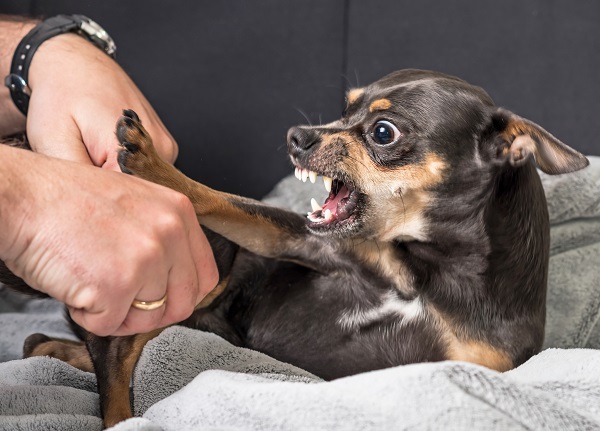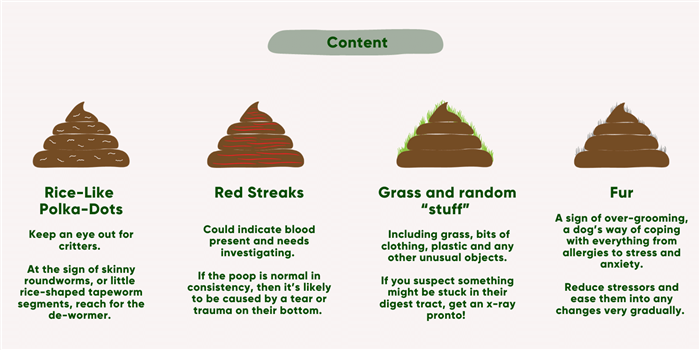Dietary indiscretion


What Home Remedy Can I Give My Dog for Diarrhea?
Diagnosis is based on signs that the vet finds during an examination and on the absence of any history of poisoning, scavenging or swallowing foreign bodies.
Summary
It is important to be able to distinguish between normal and anxious dog behaviors, which requires familiarity with your dog’s normal behavior.
Every patient with chronic GI signs should have a thorough history, physical examination, complete blood count, serum chemistry profile, urinalysis, and fecal examination performed. In many cases, this initial evaluation will determine if the etiology of the diarrhea is primary GI disease or secondary to other systemic or metabolic disease, or if the diarrhea is predominantly of small bowel or large bowel origin. For example, Addison’s disease, liver disease, and renal disease can all be associated with secondary GI involvement. If the initial work-up fails to provide a clue as to the etiology, then begin a specific GI evaluation. The fecal examination should include standard fecal flotation, wet-mount preparation, and stained cytology. A Diff-Quik-stained cytologic slide may reveal such things as neutrophils, eosinophils, fungal organisms, or clostridial spores and may provide clues about the etiology (Figures 2A-2D). This is also the time to classify the patient based on the severity of disease: minimal signs and debilitation or those cases having severe disease obviously requiring an in-depth GI work-up.
for 30 large dog doses
If my dog farts alot will he have diarea
Diarrhea often means a disorder in the organism due to the gastrointestinal tract.
* Virus or other illness
You might think you know your dog well to tell when he has a problem. But, unless you are a qualified veterinarian, you cannot really know if your dog is suffering from an underlying condition and the seriousness (or not) of this condition.
If you notice that your dog has diarrhea, there are several steps you can take to get your pup back on track.
Parasitic Infection
Dogs are notorious for being finicky eaters, and many pet owners find themselves changing their dog’s food frequently in order to find something that he or she will eat. But while a change in diet may make your dog happy, it could also lead to diarrhea. The duration of your dog’s diarrhea after changing food depends on a variety of factors, including the type of food he or she is eating and how the diet change is made. If you are changing your dog’s food gradually, over a period of several weeks, the diarrhea will likely last for that same amount of time. If your dog is suddenly switched to a new diet, the diarrhea will likely last no more than two days.
To further limit the possibility of infection, the “chicken and rice” should be prepared fresh every time it is served during feeding. The daily effort to cook ‘chicken and rice’, as previously indicated, does not even result in a meal that is nutritionally full and balanced. Vomiting and/or diarrhoea are common symptoms of gastrointestinal problems.
Steve Guttenberg is a former megastar, a hot dog world record holder , and the star of my favorite celebrity story.
Here are some vet-recommended, over-the-counter medications and supplements to help manage dog diarrhea at home:
If your dog is splashing a lot of water while drinking, measuring the exact amount of drank water can be challenging. In such cases, you should look for a deeper bowl that limits the splashing.
Can I Give My Dog Diarrhea Medicine? Answer: Consider Imodium A-D or natural remedies
A weak, dehydrated Labrador resulting from diarrhea isn’t a pleasant sight for any dog owner. As such, any owner with an affected Lab will be wondering: How do I stop my Lab from having diarrhea?
Is it normal for a dog to have diarrhea for 3 days?
If you aren’t sure that your dog has eaten something innocent, then you should see a vet as the green pigment can also be due to your dog eating toxins, in particular rat poison.
Probiotics are beneficial microorganisms found in the gastrointestinal tract. Including these organisms in your furry friend’s diet can help with digestion. If the recipe contains probiotics, it should be marked with an expiration date to guarantee that the microorganisms are still alive.
Initially, a fecal examination may be the only test conducted. This requires a small sample of stool from your dog. The veterinarian will check this to rule out parasites such as hookworms, roundworms, whipworms, protozoal organisms, and bacterial overgrowth.
Given these risks, it’s important to explore any viable alternatives to the use of antibiotics. For example, both probiotics and fecal microbiota transplantation (FMT) have been investigated as alternative approaches to IBD and other causes of diarrhea in dogs. A 2020 study published in Frontiers in Veterinary Science concluded that FMT works better than metronidazole in dogs with acute diarrhea because FMT helps to restore gut health, whereas metronidazole “has a negative impact” on the microbiome.
Since diarrhea is a symptom, usually caused by an underlying health issue, treatment of diarrhea involves finding out and treating the underlying cause.
Just like in people, there are a variety of reasons dogs might refuse to eat. These include:
There are several preventative measures you can take to help avoid life-threatening bloat in dogs. These include adding probiotics to their food, slowing down their eating and drinking, reducing stress, and discussing gastropexy surgery with your vet.
It’s no secret that dogs love food. This love of food often leads them to eat pretty well whatever they can get their paws on, meaning stomach problems and swallowed objects are things you will commonly encounter as a veterinarian. To make sure you’re prepared when the inevitable post-snack issues arrive, a solid understanding of the anatomy of the canine digestive system is essential.
Dental Problems Make Your Dog’s Breath Smell Like A Dead Animal
What should I do if my dog hasn’t pooped in 4 days? 5 tips

Dec 15, 2009 · diarrhea after neutering, is this common? (poop, vet, surgery, diet) User Name: Remember Me: Password … he has diarrhea. Runny stools and several times a day. … I had that happen to a dog and it took him a few days to readjust. I would ask him about adding yogurt or bene-bac to his food to reset his insides.
Dog diarrhea treatments are over-the-counter medications and supplements that can be used at home when your dog is experiencing stool problems. Some of these products are administered after your dog presents with diarrhea, while others can be given on a regular basis to help prevent gastrointestinal problems.
Diagnosis/Treatment
Diagnosing IBD begins with a thorough physical examination and tests to rule out other possible causes of the diarrhea and/or vomiting.
The intestines are very sensitive and will respond to anything they don’t agree with by producing mucus. It’s a defense mechanism that protects the cells.
How much Pepcid should I give my dog?

Earle Nave is a wildlife conservationist and television personality. He is 27 years old, and he has dedicated his life to helping animals. He has been featured on numerous TV shows, and he is one of the world's leading experts on animal behavior. He has worked with some of the world's most endangered species, and he has helped to protect many of them from extinction. Earle is also an accomplished author, and he has written several books about wildlife conservation.


